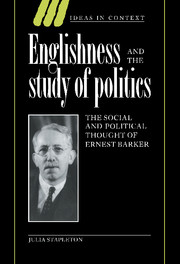Book contents
- Frontmatter
- Contents
- Acknowledgements
- Introduction: The ‘national character’ of Barker's thought
- 1 Lancashire, Idealism, and Whiggism: the making of an English political scientist
- 2 The polis, law, and the development of political studies at Oxford, 1900–1920
- 3 Society and the state in the English national past: the lure of Pluralism
- 4 Statehood, nationhood, and internationalism: English political theory and the First World War
- 5 Education and national character: the milieu of King's College London
- 6 ‘Continental’ political science and the Cambridge Chair
- 7 Traditions of civility: the construction of Englishness in the Second World War and beyond
- 8 The expansion of Englishness: the Books Commission, Europe, and the Commonwealth
- Conclusion: A late-Victorian liberal-conservative
- Select Bibliography
- Index
- Ideas in Context
1 - Lancashire, Idealism, and Whiggism: the making of an English political scientist
Published online by Cambridge University Press: 11 September 2009
- Frontmatter
- Contents
- Acknowledgements
- Introduction: The ‘national character’ of Barker's thought
- 1 Lancashire, Idealism, and Whiggism: the making of an English political scientist
- 2 The polis, law, and the development of political studies at Oxford, 1900–1920
- 3 Society and the state in the English national past: the lure of Pluralism
- 4 Statehood, nationhood, and internationalism: English political theory and the First World War
- 5 Education and national character: the milieu of King's College London
- 6 ‘Continental’ political science and the Cambridge Chair
- 7 Traditions of civility: the construction of Englishness in the Second World War and beyond
- 8 The expansion of Englishness: the Books Commission, Europe, and the Commonwealth
- Conclusion: A late-Victorian liberal-conservative
- Select Bibliography
- Index
- Ideas in Context
Summary
HOME AND SCHOOL
The frustrated ambition of working-class scholars at the end of the nineteenth century is well captured in the hero of Hardy's novel, Jude the Obscure (1895). Having immersed himself in centuries of learning during every spare moment for well over ten years, Jude Fawley's dreams of formal study were brutally shattered by the Masters' indifference at the hallowed Colleges of ‘Christminster’ – Oxford in thin disguise. The lowest rungs of the ‘ladder of opportunity’ for which Jude yearned were not installed until 1902 when the Balfour Education Act laid the foundations of public secondary education in Britain. However, it was not entirely unknown for boys of poor birth to satisfy keen intellectual aspirations before the passage of that Act. A number of factors helped to smooth the path to academic distinction from the most unlikely backgrounds. These included various scholarship schemes, luck, generous benefactors, good voluntary educational institutions in the locality, and the invaluable Cassell's National Library of Classical Literature.
For example, Barker's friend and fellow-Mancunian, George Unwin, enjoyed many of these ‘advantages’ in an environment where public educational provision was meagre. The son of a publican turned shopkeeper, he left school at the age of thirteen to become a clerk in a Stockport hat-making firm. But he soon developed a wide knowledge of philosophy and literature, chiefly through the stimulus of the Stockport literary society, the local Mechanics Institute, and the Unitarian Church.
- Type
- Chapter
- Information
- Englishness and the Study of PoliticsThe Social and Political Thought of Ernest Barker, pp. 20 - 42Publisher: Cambridge University PressPrint publication year: 1994

